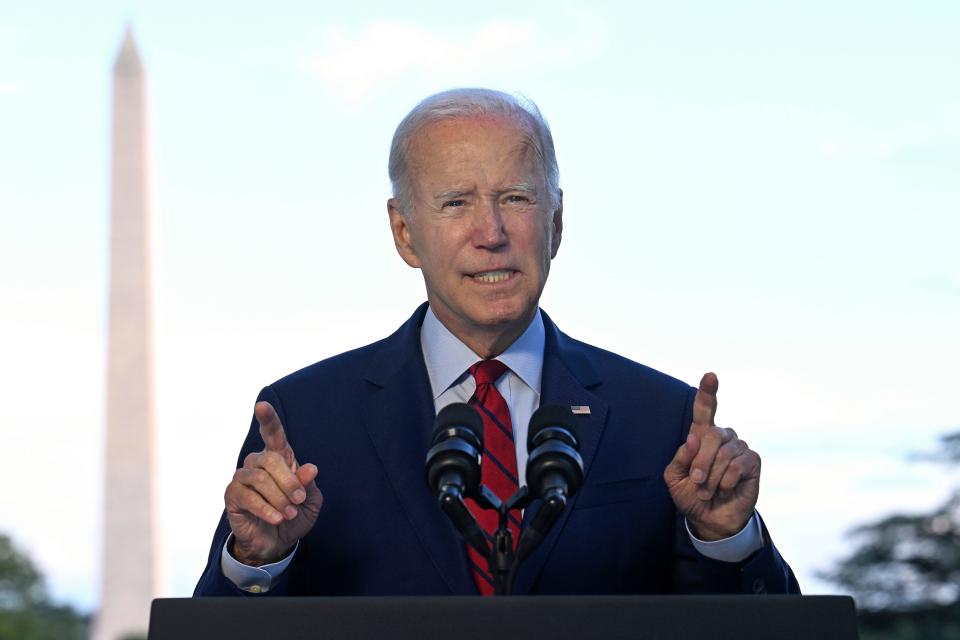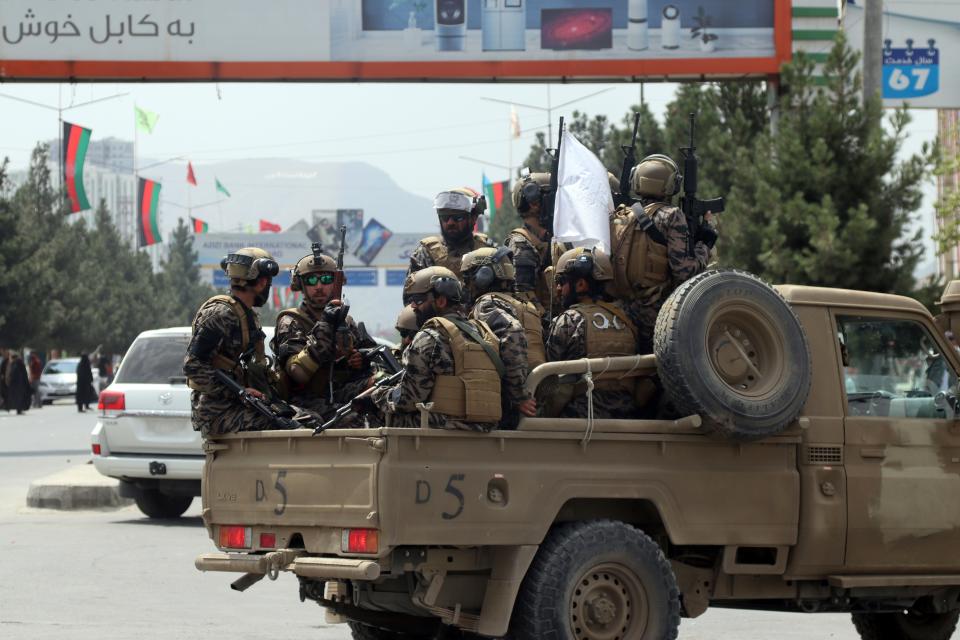'A self-inflicted wound': US withdrawal from Afghanistan still haunts Biden's presidency one year later
WASHINGTON – President Joe Biden's vast foreign policy experience was supposed to be his most significant asset.
Then came the horrifying video of civilians clinging to a U.S. military plane as it lifted off from the Kabul airport, the collapse of Afghanistan’s government, and a terror attack that killed 13 American soldiers and at least 170 Afghans less than seven months into his presidency.
The chaotic U.S. exit from Afghanistan, ending a 20-year conflict, undercut Biden’s pledge to restore competence to the White House. One year later, it hangs over the Democratic president, even as his counterterrorism strategy yields consequential results with the July 30 killing of top al-Qaida leader Ayman al-Zawahri last month.
"I remember so much good that we genuinely did do – all of it just going away with a dust in the wind," said Lt. Daniel Davis, a twice-deployed veteran of the war. "It's really painful."

Biden's approval rating fell below 50% for the first time after the messy U.S. withdrawal from Afghanistan and the Taliban's return to power. His standing still hasn't recovered amid a convergence of other crises, including 40-year-high inflation, supply chain bottlenecks, the extended COVID-19 pandemic and the spread of monkeypox.
"It damaged what were relatively good feelings toward him," Thomas Alan Schwartz, a distinguished professor of history at Vanderbilt University, said of the Afghanistan exit. "It was a self-inflicted wound."
Former Afghan attorney general: A year after the fall of Kabul, the world can still help Afghanistan
Al-Zawahri's killing, combined with a series of legislative wins for Biden in Congress, have produced Biden's most successful stretch as president. But it is unclear whether the winning streak will affect his low approval ratings, hovering around 40%, or boost Democratic fortunes in the November midterm elections.
Before ending America's longest war – waged in response to the 9/11 terrorist attacks – Biden argued the U.S. had accomplished its main objective: ensuring Afghanistan won't again be a base for terrorists to attack the homeland.
But the fall of the country's capital city to the Taliban before the U.S. ended its military operation – and the chaotic evacuation of Afghan refugees and American Embassy personnel – raised questions about Biden's governance and decision-making that have persisted amid new crises. And the searing images of frantic Afghans clamoring to be evacuated on the final U.S. flights will haunt Biden and almost surely be part of his legacy.
“The final phase was quite bad," said Zalmay Khalilzad, the former U.S. special representative for Afghanistan reconciliation, who served in the Trump administration and stayed on under Biden. "Anyone who was watching it could see it was not well done.”
Should Biden have known the Afghan forces would collapse?
Khalilzad helped broker the Trump administration's agreement with the Taliban, which set the conditions for the U.S. withdrawal.
More: With last plane out of Kabul, America's 20-year war in Afghanistan is over
Biden administration officials and backers of the withdrawal such as Khalilzad said that while mistakes were made during the final phase, America is better positioned now than it was a year ago to take on growing challenges outside the region while fulfilling the president's pledge not to allow Afghanistan to become a launching pad for terrorist attacks against the United States.
Over the course of 17 days, the U.S. military and its allies and partners evacuated 124,000 people out of the landlocked country by air, John Kirby, coordinator for strategic communications at the National Security Council, emphasized in an interview with USA TODAY.
“The evacuation was historic and unprecedented in its size and scale and scope,” Kirby said. “Nobody has ever said that it was performed perfectly.”

Davis, who was among the veterans who supported the withdrawal, said Biden's military advisers should have foreseen that the Afghan army – unmotivated, disorganized and plagued by low morale – would struggle against the Taliban. Even so, he credited Biden for making the tough decision to leave Afghanistan.
"He's the only president that had the courage to take the political risk and order what should have been done a decade earlier at the least," Davis said, adding multiple administrations made bad decisions about the war.
"It wasn't just Biden. He came in at the tail end of this."
It was Biden who took the hit, however.
In recent weeks, some Democrats have said publicly that Biden should not seek reelection in 2024. Republicans have worked to link the disastrous departure from Afghanistan to Russia’s war in Ukraine and Chinese aggression against Taiwan.
"I think there's a direct cause and effect between the collapse of Afghanistan and Putin's decision to invade Ukraine," said Rep. Michael McCaul, lead Republican on the House Foreign Affairs Committee.
'It was not about chasing polls'
Biden has been unrepentant about his decision to leave Afghanistan.
"There was no way to get out of Afghanistan, after 20 years, easily. Not possible no matter when you did it," he said at a news conference in January. "And I make no apologies for what I did."
Fall of Kabul, fall of Saigon:: Their horror was our horror. Anguished, we pray for a miracle.
The president believed leaving was in the national interest, Kirby said, and so did the majority of Americans.
A majority of Americans did say the U.S. should leave Afghanistan amid the drawdown. A little more than a quarter approved of Biden's handling of the pullout. The topic has almost completely fallen off the radar for most voters now, but critics of the withdrawal say it could reemerge as an issue in the next presidential election.
Biden’s exit hurt U.S. credibility, unleashed a “human rights nightmare” in Afghanistan and paved the way for terrorists to operate from there again, said Richard Haass, a top aide in the State Department when President George W. Bush led the U.S. into Afghanistan after 9/11.
“I believe it will be seen as an error,” said Haass, now president of the Council on Foreign Relations.
Kirby and others flatly reject that view.
“We view the killing of Mr. Zawahri as a representation of exactly what the president said he was going to do,” Kirby said. “This was not about trying to bookend the evacuation of Afghanistan. It was not about chasing polls or approval ratings. It was about meeting his commitment to the American people.”

Biden said last year that he was sticking to the agreement because the U.S. had already begun its drawdown of forces and America could not be tethered to Afghanistan with terror threats metastasizing elsewhere.
Staying would have meant risking more American soldiers’ lives and sinking resources into a more than $2 trillion war that had resulted in more than 2,400 American casualties, Biden said.
He also said the U.S. needed to prioritize other foreign policy challenges, including its ability to compete with China.
Administration officials are leaning heavily on those arguments now as the U.S. and its allies pump billions of dollars into Ukraine’s defense against Russia and tensions escalate between Beijing and Taiwan, an island that considers itself sovereign from China.
More: Watchdog: US troop pullout was key factor in Afghan collapse
A 'turning point' for Biden and US foreign policy?
But Republicans argue the quick collapse of Afghanistan after Biden’s withdrawal displayed weakness to adversaries, which opened the door for Russian President Vladimir Putin’s invasion of Ukraine and Chinese hostility toward Taiwan.
Afghanistan was “a turning point in American foreign policy,” McCaul said.
“After Afghanistan, our foreign nation adversaries began to be more emboldened and empowered,” McCaul said. “We were no longer projecting strength as a superpower, we were projecting weakness, and weakness always invites aggression. And I think you're seeing that on the global stage today.”
McCaul said complications with the Afghanistan withdrawal were foreseeable, and he drew a parallel between Biden and one-term Democratic President Jimmy Carter, who lost his 1980 reelection bid amid high unemployment, high inflation and the Iran hostage crisis at the U.S. Embassy in Tehran.
“The American people do care about this,” McCaul said.
Biden’s prediction last July that it was “ highly unlikely” the Taliban would overrun Afghanistan, only to have the nation’s former president, Ashraf Ghani, flee the country weeks later as the militant group closed in on Kabul, was particularly ill-fated.
If officials involved in the operation had known the Afghan government and military would not put up a strong fight, “we would have done, probably, that final phase of the withdrawal differently,” Khalilzad said. “There are lots of what-ifs.”
“Certainly the pictures of the final days of West forces leaving Kabul airport, and the Afghans from Kabul and elsewhere coming to the airport, wanting to leave with the U.S. forces, those pictures were very, very bad. But nevertheless, we brought a lot of people out, we did get out.”
This article originally appeared on USA TODAY: Can Biden repair the political damage from Afghanistan withdrawal?
